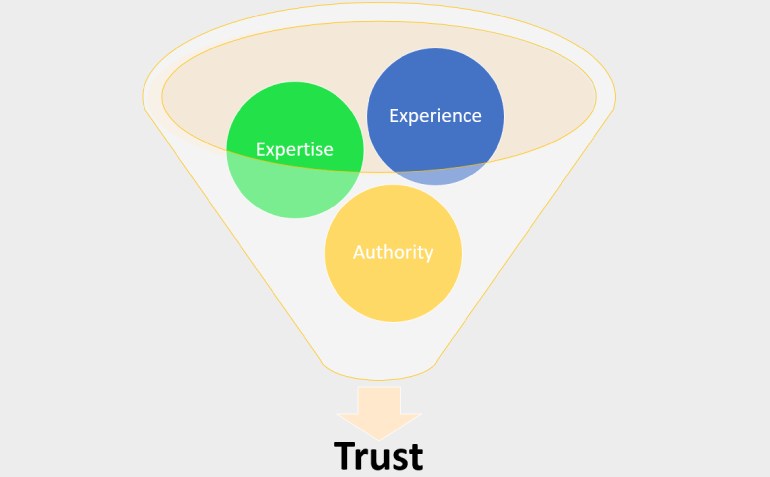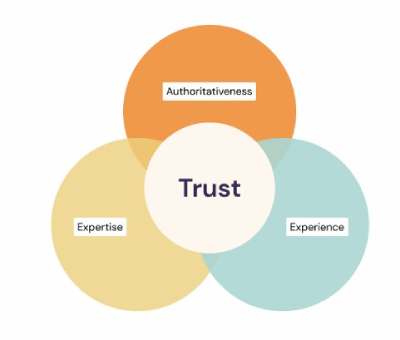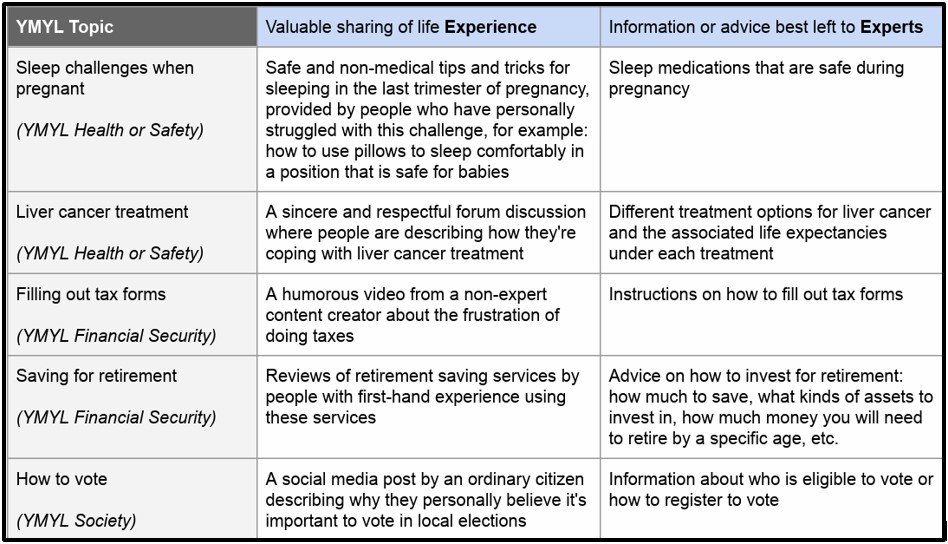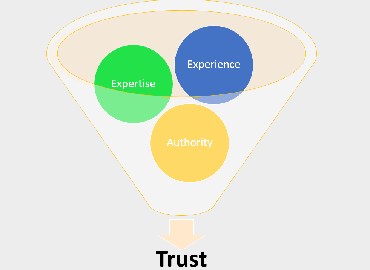
Google is bombarded with loads of content from different pages every day, some good and some bad. The question is: How does it determine which page’s content should be ranked higher? With the help of Page Quality Rating (PQ rating). And E-E-A-T or Double E-A-T happens to be an important consideration for PQ rating.
Let’s look at this more closely now.
What Does E-E-A-T Stand For?
E-E-A-T stands for:
- E – Experience
- E – Expertise
- A – Authoritativeness
- T – Trust

Simply put, it’s used by individuals called Quality Raters to measure and evaluate Google’s search ranking system. When first introduced, the acronym only consisted of E-A-T. Later on, in December 2022, Google refined it further and added the criterion ‘Experience.’
Now, why do you need to include it in your Search Engine Optimization strategy? The long and short answer is to rank at Google’s SERPs. Mind you, it is not a ranking factor algorithm. It’s a component of Google’s Search Quality Rater Guidelines.
TRUST – Most Important Of All
If Google assesses your page, will it find your page honest, accurate, reliable, and safe?
Think wisely and answer. Consider all aspects – the content you share, your payment gateways, the ways you collect data, and more.
If Google does, then your page is trustworthy. So, simply put, trust is at the core of everything and the most important of the 4 sub-components. In fact, experience, expertise, and authoritativeness support the assessment of trust.
Now, of course, the type and need of trust varies from one page to another. For instance, if you have an online store, then having a safe payment gateway and reliable customer service should be a priority. Furthermore, creating fake product reviews is going to be seen as unworthy since the goal of a product review is to help others make a good buying decision.
Another example is that of informative pages. If your page is an informative page discussing YMYL (Your Money or Your Life) topics, then the content must be accurate and fact-checked to avoid harm. However, if you create social media posts on non-YMYL topics, then they may not need a high level of trust since they are for entertainment purposes.
Here’s how Google understands YMYL:

So, if your page is considered untrustworthy, it will have a low E-E-A-T, regardless of how experienced, expert, and authoritative it may seem.
Naturally, this will make you ask the following question: How do you create a Google-approved trustworthy page? By building your other 3 components well.
Experience: The New Addition
Google understands experience as first-hand or life experiences. And this depends on the content creator or the author.
For instance, when comparing travel sites, are you more likely to trust a site by a travel blogger who’s traveled to that particular place or by someone who’s never traveled before? Similarly, when it comes to finance or taxes, are you more likely to trust a working expert in the field or someone who only sees the field from the outside?
This means that your content is more likely to rank higher if the author has actual experience on the topic they are creating content around. For instance, a dermatologist talking about skin health or Neil Patel talking about digital marketing.
Also Read- How to Optimize Your Content for SEO
Expertise: The Other E
Expertise is about knowledge and skills. And to gain that naturally, you need experience. But here’s the trick. It’s not the other way around. Experience does not come from expertise. Again, different topics call for different levels of expertise.
Here’s what the Google guidelines have to say —
“For example, which would you trust: home electrical rewiring advice from a skilled electrician or from an antique homes enthusiast who has no knowledge of electrical wiring?”
The rater’s guidelines suggest that the author’s expertise on a subject counts. Yet there are instances where the author’s expertise as an individual has not affected the E-E-A-T. However, with the rise of AI-generated content, Google is prioritizing human-written content, just like this blog.
So, don’t be too quick to dismiss the author’s expertise on the subject matter. In fact, add the author’s name and a descriptive bio, outlining their qualifications and linking relevant social media handles towards the end of your content pieces.
Authoritativeness: Are You a Go-To Source?
Authoritativeness is about whether or not a particular page is a go-to site for something. For example, Forbes is a go-to site for all things business, society, and culture. Similarly, The National Portal of India is the go-to site for information from all government departments. When it comes to beauty and fashion, you may prioritize Elle or Vogue.
Now, here’s the catch: Most topics don’t have one final authoritative source. Wondering how you can build it? Here’s how!
- Create a strong architecture for your content. Make sure you cover all aspects of a topic. You can get help from sites like Answer The Public. For example, here’s a search for topics around SEO that are frequently asked. You can refine this further to create your content architecture for your content bucket “SEO.”

- Create backlinks from authoritative sites.
- Show Google who you are and what you can do by building a personal brand.
Quick Tips for E-E-A-T in SEO
Now that you’ve understood the E-E-A-T component of Google Page Quality Ranking, here are some quick tips for you:
- Optimize your page experience for the best user experience. It should fulfill the purpose of creation, be skillfully designed, be easy to use, and feature high-quality main content.
- Make sure your technical SEO is in place.
- Humanize your website with About Us and Teams Page. Feature photos and support them with expertise and experience.
- Backlink to trusted sources.
- Update your content pieces regularly.
- Be smart when creating content buckets and topic clusters. See that they cover everything.
- Experiment with different content types like blogs, videos, podcasts, etc.
- Include expert quotes in your content and link them well.
Also Read- 5 Reasons Why You Need to Invest in SEO!
While this may look challenging, it can definitely get easier with the right partner who knows about E-E-A-T, SEO, and Google guidelines. Our team at Impulse Digital stays up-to-date with the tiniest changes and incorporates them into a strategy for excellent performance. Want us to build with you? We’re here!


